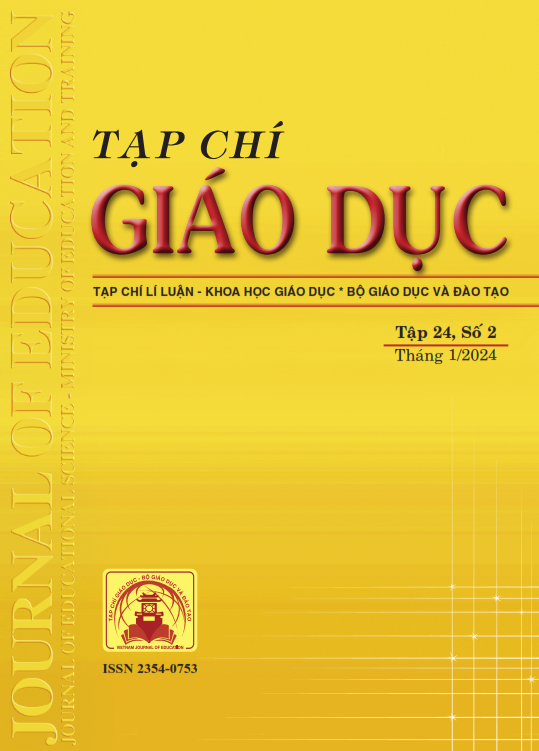Thiết kế chủ đề giáo dục STEM trong dạy học “Chuyên đề học tập Tin học 10 - Định hướng khoa học máy tính”
Tóm tắt
STEM-oriented teaching helps students learn through experience, theory links practice. In the 2018 general education program, STEM education has received significant attention. However, in the subject of Informatics, there are no works that discuss the theoretical basis of STEM education and its application to teaching the subject of Informatics. The article presents the 6- step process of designing STEM education topics in teaching Informatics and apply this process to design the STEM education topic “Street lights turn on and off automatically” in teaching “Informatics topic 10 - Computer science orientation”. This design process can be applied to design STEM activities according to different content and topics in Informatics to improve the quality of teaching in high schools.
Tài liệu tham khảo
Bộ GD-ĐT (2018). Chương trình giáo dục phổ thông - Chương trình tổng thể (ban hành kèm theo Thông tư số 32/2018/TT-BGDĐT ngày 26/12/2018 của Bộ trưởng Bộ GD-ĐT).
Bộ GD-ĐT (2020). Công văn số 3089/BGDĐT-TrH ngày 14/8/2020 về việc triển khai thực hiện giáo dục STEM trong giáo dục trung học.
Crippen, K. J., & Archambault, L. (2012). Scaffolded inquiry-based instruction with technology: A signature pedagogy for STEM education. Computers in the Schools, 29, 157-173.
Hà Thị Lan Hương (2020). Giáo dục STEM ở nhà trường phổ thông và những vấn đề đặt ra trong việc xây dựng khung năng lực giáo dục STEM cho sinh viên sư phạm. Tạp chí Khoa học, Trường Đại học Sư phạm Hà Nội, 65(4C), 196-203.
Johnson, C. C., Peters-Burton, E. E., & Moore, T. J. (2016). STEM road map: A framework for integrated STEM education. New York: Routledge.
Kalolo, J. F. (2016). Re-Aligning Approaches for Successful Implementation of STEM Education in Today's Elementary Schools in Developing Countries: Policy Commitments and Practices. Journal of Education and Literature, 4(2), 61-76.
Kelley, T. R., & Knowles, J. G., (2016). A conceptual framework for integrated STEM education. International Journal of STEM Education, 3(1). https://doi.org/10.1186/s40594-016-0046-z
Lê Xuân Quang (2017). Dạy học môn Công nghệ phổ thông theo định hướng giáo dục STEM. Luận án tiến sĩ Giáo dục học, Trường Đại học Sư phạm Hà Nội.
Moomaw, S. (2013). Teaching STEM in the earl years: Activities forintegrating science, technology, engineering, and mathematics. St. Paul, MN: Redleaf Press.
Nguyễn Thanh Nga (chủ biên), Phùng Việt Hải, Nguyễn Quang Linh, Hoàng Phước Muội (2017). Thiết kế và tổ chức chủ đề giáo dục STEM cho học sinh trung học cơ sở và trung học phổ thông. NXB Đại học Sư phạm TP. Hồ Chí Minh.
Pennsylvania Autism Census Project: Final Report (2009). PsycEXTRA Dataset.
Talley, T. (2016) The STEM coaching handbook: Working with teachers to improve instruction. New York. Tawfik, A., & Trueman, R. (2015). Effects of case libraries in supporting a problembased learning STEM course. Journal of Educational Technology Systems, 44(1), 5-21.
Vasquez, J. A., Sneider, C., & Comer, M. (2013). STEM lesson essentials, grades 3-8: Integrating science, technology, engineering, and mathematics. Portsmouth, HN: Heinemann.
Tải xuống
Đã Xuất bản
Cách trích dẫn
Số
Chuyên mục
Giấy phép

Tác phẩm này được cấp phép theo Ghi nhận tác giả của Creative Commons Giấy phép quốc tế 4.0 .












